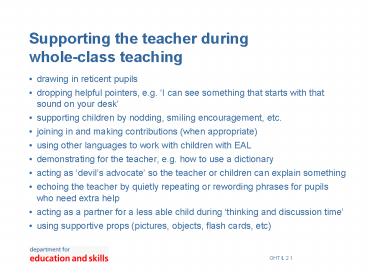Supporting the teacher during wholeclass teaching - PowerPoint PPT Presentation
1 / 6
Title:
Supporting the teacher during wholeclass teaching
Description:
supporting children by nodding, smiling encouragement, etc. ... acting as a partner for a less able child during thinking and discussion time' ... – PowerPoint PPT presentation
Number of Views:52
Avg rating:3.0/5.0
Title: Supporting the teacher during wholeclass teaching
1
Supporting the teacher during whole-class
teaching
- drawing in reticent pupils
- dropping helpful pointers, e.g. I can see
something that starts with that sound on your
desk - supporting children by nodding, smiling
encouragement, etc. - joining in and making contributions (when
appropriate) - using other languages to work with children
with EAL - demonstrating for the teacher, e.g. how to use
a dictionary - acting as devils advocate so the teacher or
children can explain something - echoing the teacher by quietly repeating or
rewording phrases for pupils who need extra help - acting as a partner for a less able child
during thinking and discussion time - using supportive props (pictures, objects,
flash cards, etc)
OHT L 2.1
2
Behaviour management
- sitting alongside a difficult child
- focusing a child/childrens attention
- making eye contact
- support for children who need specific help to
access the lesson - troubleshooting, e.g. sorting out minor
disagreements within groups
OHT L 2.2
3
Resource management
- preparing, distributing and collecting pupil
resources - helping pupils use resources
- supporting the effective use of teachers
props, e.g. changing OHTs
OHT L 2.3
4
An extra pair of eyes
- observing individual pupils
- noting who can and who cant
- comparing notes and giving feedback to the
teacher
OHT L 2.4
5
Assisting during group work
- Guided reading and writing
- supporting group discussion
- helping children with activities, e.g. playing
Pelmanism - assessing progress to feed back to the teacher
OHT L 2.5
6
Structure of the Literacy Hour
A minimum entitlement of a daily Literacy
HourCurricular and childrens targets are
visible, monitored and assessed
Whole class Plenary including opportunities to-
review progress- make connections to other
learning- reinforce the objectives of the lesson
Whole class shared workWork is based on NLS
Framework and other age-related
publications Shared reading to enrich, improve
fluency, support comprehension and response, and
provide models for writing Shared writing to
demonstrate and support independent writing Word
work including systematic teaching of phonics
and/or spelling Sentence work as appropriate
Whole class Plenary approx. 10 mins
Group and independent work Guided reading or
writing Independent tasks to develop and
consolidate literacy skills Second wave support
offered where needed
Whole class shared work approx. 30 mins
Group andindependent work approx. 20 mins
Literacy beyond the literacy hour - application
of skills across the curriculum, particularly
non-fiction- application time, e.g. independent
reading, handwriting- reading to children, e.g.
class novel
OHT L 2.6































